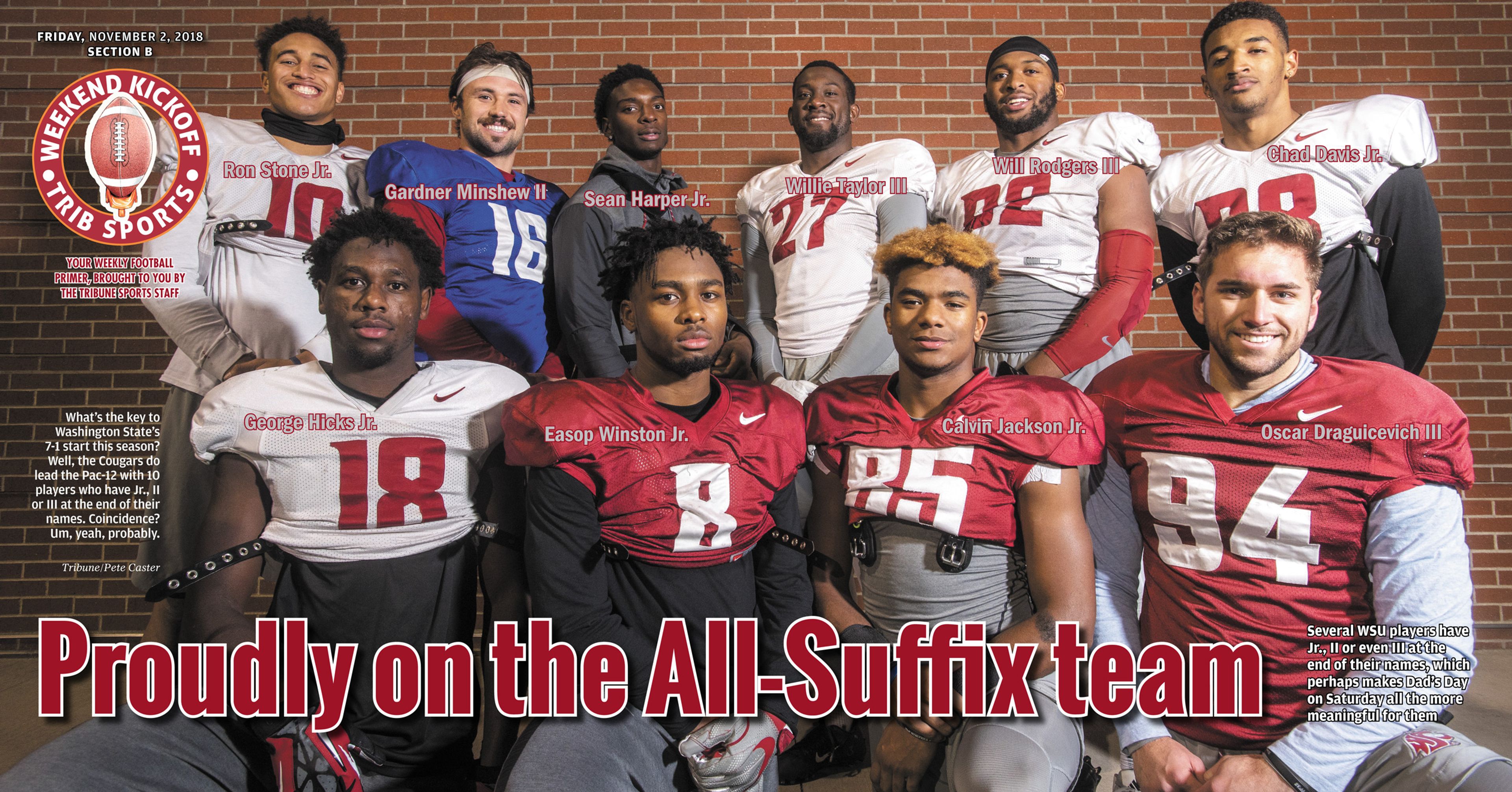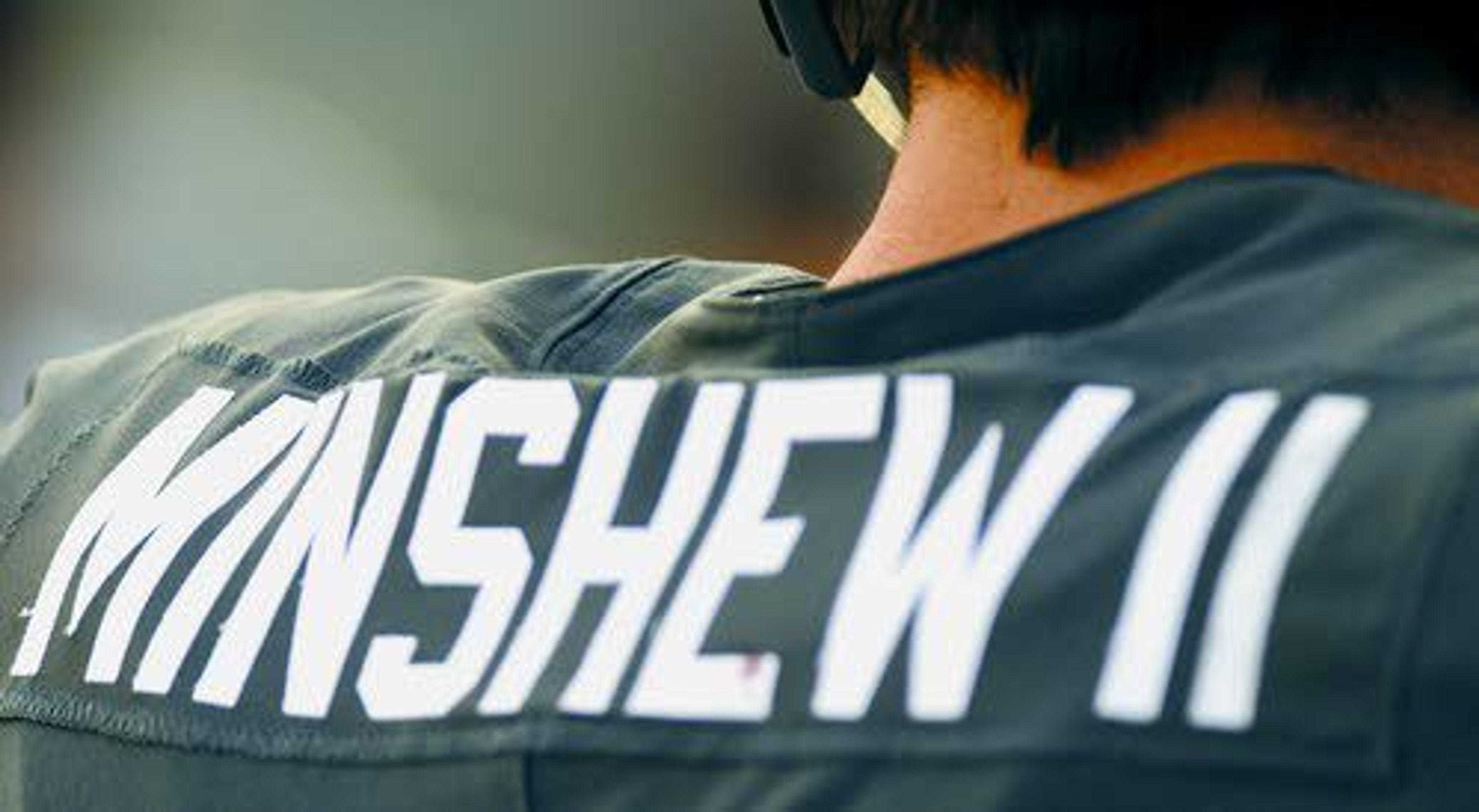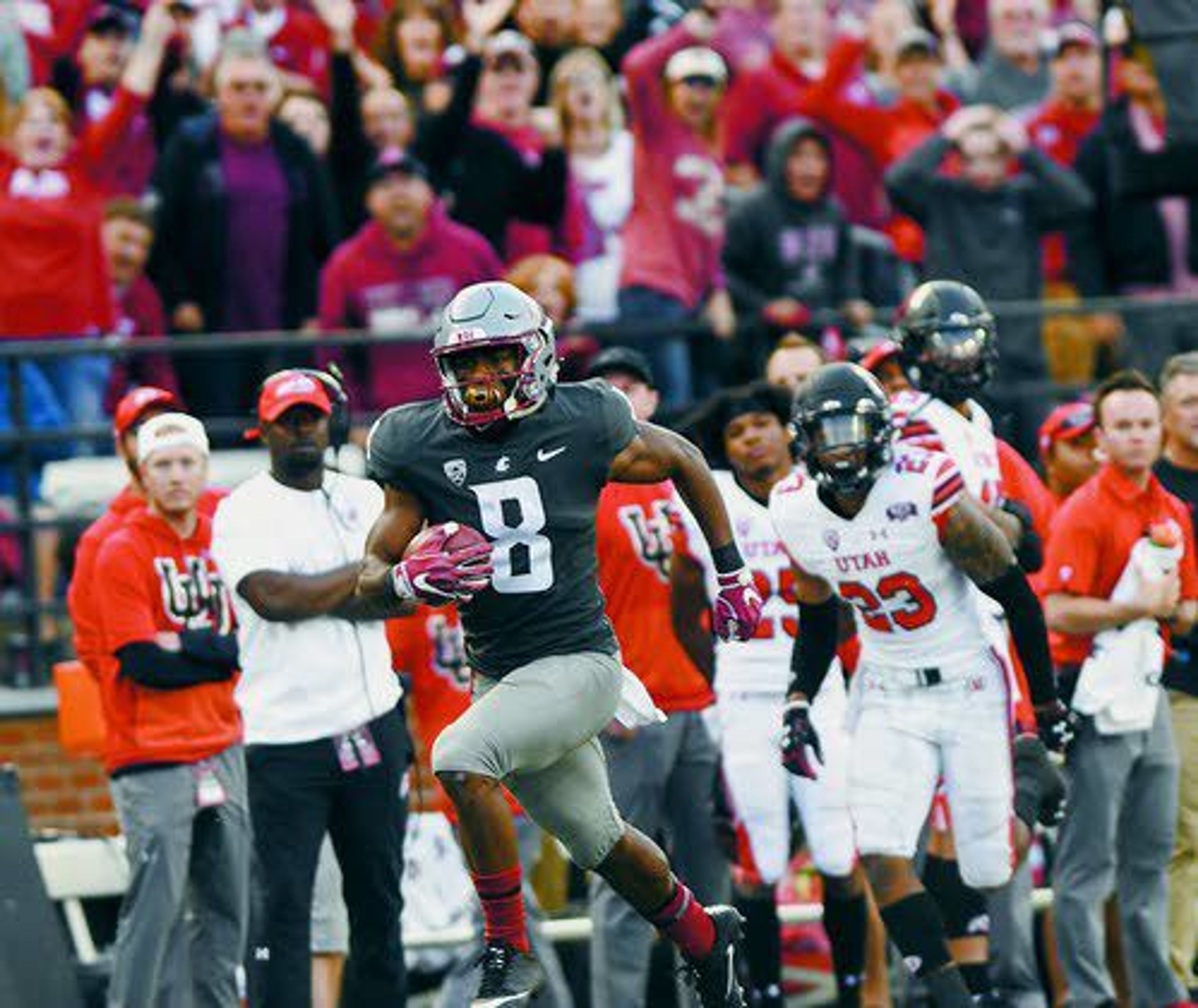For these Cougars, every day is Dad's Day
Judging by their jerseys, Cougars rank high when it comes to honoring Pops
PULLMAN - Sure, the Washington State Cougars are 10th in the Associated Press poll and eighth in the College Football Playoff rankings.
But they rate even higher in a slightly more obscure pecking order: the generational suffix list. Since it's Dad's Day in Wazzu football this week, let's call it the Honoring Dad and Grandpa List.
If you scan the rosters of all 65 members of the Power Five conferences, the Cougars rank No. 4 in the number of names that include generational suffixes such as Jr., II and III.
Miami tops the list at 14 and is followed by Kansas at 13, West Virginia at 12 and Washington State at 10. And the Cougars are the Pac-12 champions by this reckoning, defeating USC 10-7.
By traditional standards, all these numbers are strikingly high. In recent years, for whatever reason, football players have begun referencing fathers, grandfathers and other family members in the names that appear on team rosters and - more to the point - on the backs of their jerseys. Surely some of them have touted the suffixes their entire lives, but most appear to be making them more prominent as their own careers are becoming more prominent.
In a story last year, ESPN pointed out the trend in the National Football League and attributed it to the influence of Heisman Trophy winner Robert Griffin III, who in 2012 became the first NFL player ever to have a Roman numeral on his back.
But the trend is even more noticeable in college football. On Power Five online rosters, there are 256 generational suffixes - mostly Jr. and III but also the occasional IV or V. Two players even allude to sons by adopting a Sr.
And those are just official rosters, which typically are not of great concern to players. More important to them is getting that family shout-out on their jerseys.
In a hastily arranged chat this week with eight of the 10 Washington State players who use suffixes in their names, all said they use them to honor their fathers, some of whom will be in attendance when the Cougars (7-1, 4-1) play California (5-3, 2-3) in a Dad's Day game on ESPN on Saturday night.
Kickoff is 7:45 p.m. at Martin Stadium in Pullman.
At the head of the WSU Fighting Suffixes is their star quarterback, Gardner Minshew II, the national passing leader. Newspaper stories often exclude the II because it's typographically problematic, but the suffix appears on both the WSU roster and Minshew's jersey.
His father, a general contractor in Mississippi, goes by his middle name, Flint, but his real first name is Gardner. His son is also named Gardner Flint Minshew, punctuated with a II, and he first started using the suffix on his jersey when he played for East Carolina prior to transferring to WSU this year.
"Having it on my jersey is a tribute to him," the quarterback said of his father, who has attended seven of the Cougars' eight game this season and will be here Saturday. "He's made so many sacrifices for me to play ball. It's just a way to pay him back."
Another member of the Cougars' suffix club is one of Minshew's favorite receivers, the uniquely named Easop Winston Jr.
"My middle name is my grandpa's first name, Lavelle," Winston Jr. said. "My grandma named my dad, and my dad just wanted me to be a junior. He and my mom came to the consensus that's what it would be, so here I am."
Also in the club are receiver Calvin Jackson Jr. and four members of the WSU defensive rotation: Sean Harper Jr., George Hicks III, Will Rodgers III and Willie Taylor III. Rounding out the list are punter Oscar Draguicevich III and young defenders Chad Davis Jr. and Ron Stone Jr.
Draguicevich's father, who will also be in attendance Saturday, is a Texas native who played pro soccer for a decade, including three years in the MLS. By including III in his name, the WSU punter is expressing admiration for Dad's work ethic.
"He'll bust his ass for anything just to get it done," he said. "Make it happen - that's the quote he always tells me. Make it happen no matter what."
In the general population, the use of generational suffixes has declined in recent decades, according to English professor Grant Smith of Eastern Washington University, citing studies by a colleague, Cleveland Evans of Bellevue University in Nebraska. Both men are past presidents of the American Name Society.
"Now, in male athletes, you have a little more testosterone flowing maybe, or something like that," Smith said. "It doesn't surprise me at all that there'd be a higher percentage of juniors and other lineage markers.
"The main thing to realize is that this comes and goes," he said. "It's just like names in general. There are names that rise in popularity and then decline. And that shifting around is constant. It's a question of popularity and popular culture, and popular culture is always bubbling around."
Name experts also point out that it's sometimes the mother, not the father, who initiates the idea of giving a family name to a son.
That was the case with Gardner Flint Minshew II, according to his father.
"Gardner is my mother's maiden name, and Flint is my grandmother's maiden name," the elder Minshew said by phone Thursday. "And actually my wife, when he was born, that's what she wanted to name him.
"And she didn't want him to be a Junior," he added, "because down here in Mississippi, if you're a Junior, you're probably either called Junior or Bubba. So that's why she wanted it to be II."
Hmm. Maybe that's where the Cougar roster is still lagging. Not a single Bubba.
---
Grummert may be contacted at daleg@lmtribune.com or (208) 848-2290.











